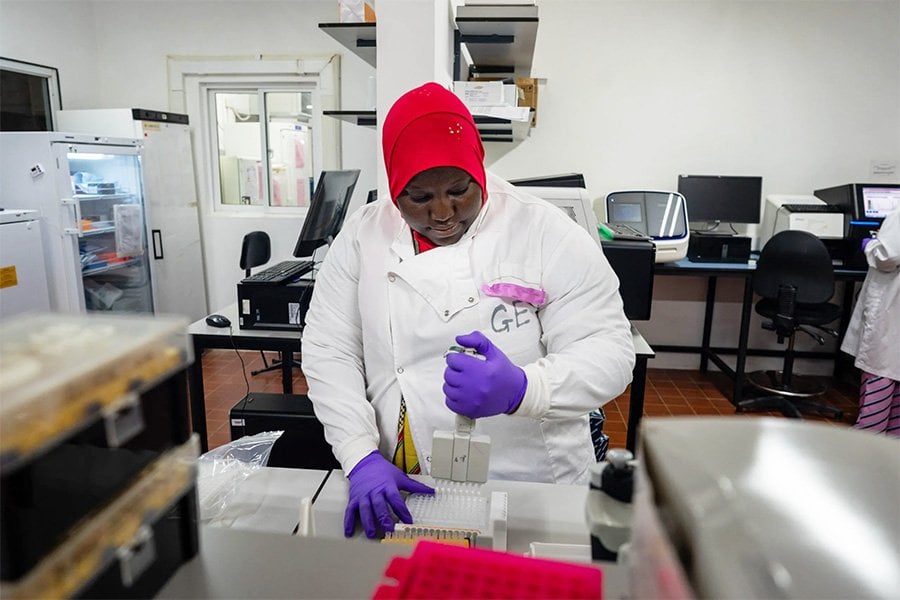
This collaboration was led by two laboratories that set up the network for genomics surveillance in South Africa: CERI at Stellenbosch University, KRISP at UKZN, in close coordination with the Africa CDC, WHO AFRO and 300 other institutions across the continent, including the MRCG at LSHTM.
Researchers from the Genomics Strategic Core Platform at the Medical Research Council Unit The Gambia at LSHTM (MRCG at LSHTM) and partners at the Gambia National Public Health Laboratories (NPHL) are part of the over 300 authors from Africa and abroad that worked together to describe and analyse over 100,000 genomes and characterise variants in real-time. This was the largest consortium of African scientists and public health institutions working together to support data-driven COVID-19 response in Africa.
This publication shows how the large investment, collaboration, and capacity building in genomic surveillance on the African continent enabled real-time public health response. Particularly it describes the setting up of the Africa CDC – Africa Pathogen Genomics Initiative (Africa PGI) and the continental network by the Africa CDC and WHO AFRO to expand access to sequencing and cover surveillance blind spots, in parallel with the growth of the number of countries that are able to sequence SARS-CoV-2 within the country.
Dr Abdul Karim Sesay, Head of the Genomics Strategic Core Platform at the MRCG at LSHTM led the collaboration from The Gambia. He said “The publication highlights the successful emergence of active collaborations being implemented in Africa, with scientists, public health institutions and policy makers in responding to the ongoing global pandemic. I am proud of the teams in The Gambia that have worked tirelessly to make this happen from the sample collectors, clinical staff, laboratory personnel at the National Public Health Laboratories and the other health workers at the MRCG at LSHTM and in the Ministry of Health. We cannot forget our very resilient African population for their cooperation and support. I am very proud as an African to be part of this important work and publication”.
Dr. Yenew Kebede, Head of the Division of Laboratory Systems and Networks at the Africa CDC commented, “The publication highlights that sustained investment for diagnostics and genomic surveillance in Africa was needed to not only help combat SARS-CoV-2 on the continent, but establish a platform to address the emerging, re-emerging, endemic infectious disease threats, such as Ebola, HIV/AIDS, TB, and Malaria. These investments are crucial for pandemic preparedness and response and will serve the health of the continent well into the 21st century.”
The results also highlight the early warning capacity that genomic surveillance in Africa has had for the rest of the world with the detection of new lineages and variants, the most relevant being the detection of Beta and various Omicron subvariants. The publication highlights that most of the variants causing epidemic in Africa were introduced from abroad.
The initial waves of infections in Africa were primarily seeded by multiple introductions of viral lineages from abroad (mainly Europe). The Alpha variant that emerged in Europe in the end of 2020 ended up causing infections in 43 countries with evidence of community transmission in Ghana, Nigeria, Kenya, Gabon, and Angola.
For Delta, the bulk of introductions was attributed to India (~72%), mainland Europe (~8%), the UK (~5%), and the US (~2.5%). Viral introductions of Delta also occurred from one African country to others in 7% of inferred introduction.
For Omicron the scientific results inferred more reintroductions of the variant back into Africa, at least 69 (95% CI: 60 – 78) from Europe and 102 (95% CI: 92 – 112) from North America than from other African countries. This was amplified for Omicron BA.2; the results infer at least 99 separate introduction or reintroduction events of BA.2 into African countries, of which ~65% are from Europe and ~30% from Asia.
The scientists proceeded carefully in analysing genomic and epidemiological data collected in over 50 countries that experienced quite heterogenous epidemics to reconstruct transmission dynamics of the virus in the most accurate way.
Dr. Ahmed Ogwell, Acting Director of the Africa CDC said, “This study is a testament for Africa CDC – Africa Pathogen Genomics Initiatives efforts to expand access to sequencing to Member States and create a platform for coordination and collaboration among institutions within and outside of the continent.”
In under 5 years, the MRCG at LSHTM has established a state-of-the-art genomics core at the Unit, and invested in the initiation, training, and development of scientists – both young and old The Unit has been a driving force for genomics in the sub-region, providing technical and capacity building support to laboratories in West Africa.
Publication
The evolving SARS-CoV-2 epidemic in Africa: Insights from rapidly expanding genomic surveillance
If you enjoyed this article and would like to build a career in global health, we offer a range of MSc programmes covering health and data, infectious and tropical diseases, population health, and public health and policy.
Available on campus or online, including flexible study that works around your work and home life, be part of a global community at the UK's no.1 public health university.
